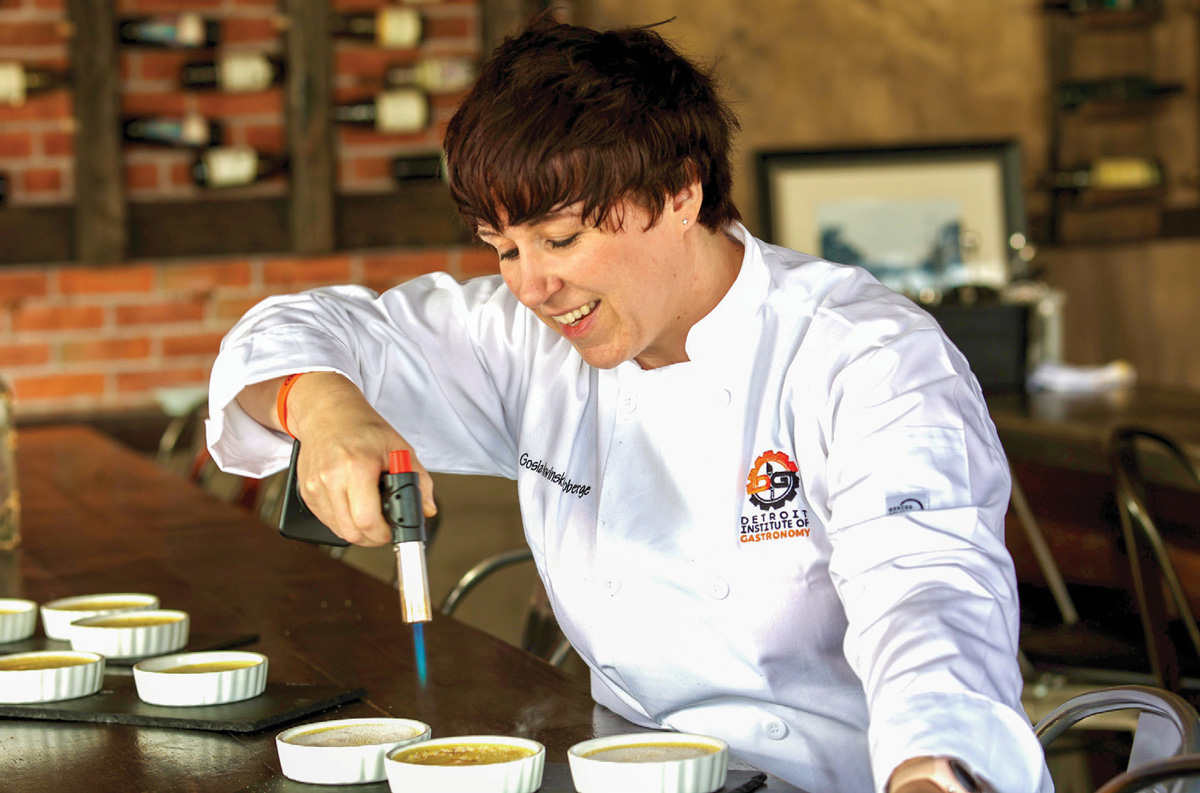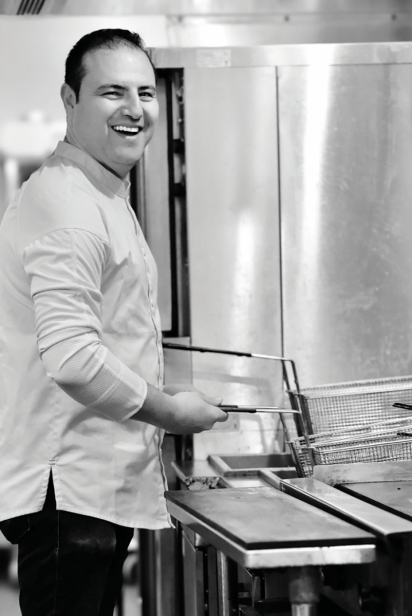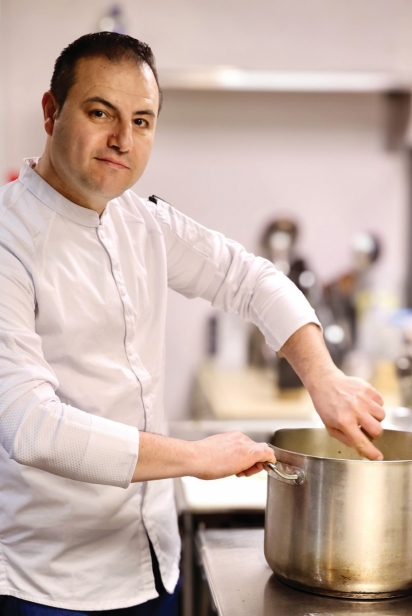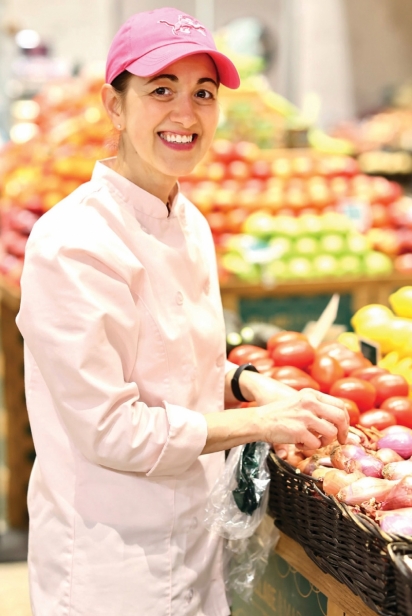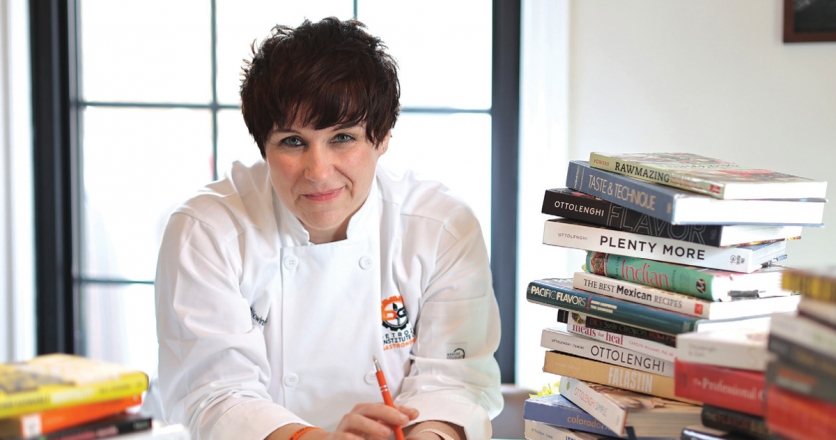Thinking Outside the Restaurant Kitchen
“You shouldn’t sacrifice flavor ever.”
—NISHAN ANDONIAN
There’s more than one path to a culinary career. For some chefs, stepping outside of commercial kitchens has brought personal and professional rewards.
FOR NISHAN ANDONIAN, there’s no such thing as a typical day on the job.
As a food entrepreneur and owner of Entice Catering in Bingham Woods, Andonian spends his days juggling catering orders and a retail café and creating from-scratch meals for up to 50 families at a time. If he’s not shopping at an organic market, he’s meeting with clients, prepping food, mixing sauces, planning meals or tending to budgeting or any of a dozen other tasks on his list. It can get hectic, he admits. Still, he wouldn’t trade his wildly busy life for anything.
For Andonian and other chefs who have stepped outside of the restaurant kitchen, taking a different path has brought personal and professional rewards.
Like personal chef Gosia Roberge and private chef Julie Piazza, Andonian draws from a wealth of knowledge and experience gained in commercial kitchens to inform his work with Southeast Michigan families and clients. Despite the long hours, these chefs say they wouldn’t trade their job for any amount of money or accolades in a restaurant.
Many people Roberge encounters aren’t aware that being a personal chef is a potential career path for trained culinarians. “It’s definitely a niche,” says Roberge. “It’s not for everyone.”
Piazza refers to herself as a private chef, since she works for only one or two clients at a time and has a strict confidentiality clause. It’s a slightly unusual arrangement, she admits; most private chefs only have one client. But since the two families she works with are both located in Grosse Pointe, Piazza can coordinate shopping, menu planning and stocking her clients’ pantries and refrigerators. Although she has been away from restaurant kitchens for 20 years, she still leans on her experience there, she says, to set herself up to work more efficiently.
Her experience also gives Piazza the ability to bring the restaurant to her clients. Occasionally, her clients will enjoy a meal at a fine-dining restaurant and ask her to re-create it. That’s where her experience comes in handy. “A lot of times, [dishes] like that don’t necessarily have a recipe online for them,” she says. “So I’m able to utilize my experience working in restaurants, and knowing how things are done in a restaurant setting versus how things are done in a home.”
In her role, Piazza says she’s been able to bypass the traditional restaurant management ladder and skip directly to her favorite parts of being a chef. She earned her degree from the Culinary Institute of America and worked for several restaurants, but, she says, restaurant jobs aren’t paying enough for someone with two degrees. She worked as a restaurant manager several times but missed the tactile experience of cooking and the ability to use her senses to prepare dishes she could be proud of and people would enjoy. She wanted to interact more directly with her diners and see the happiness her cooking brought to her clients.
“So I’m able to utilize my experience working in restaurants, and knowing how things are done in a restaurant setting versus how things are done in a home.”
—JULIE PIAZZA
Being responsive to clients’ requests is a cornerstone of a personal chef ’s job responsibilities. As food trends change, so too do family cooking requests. Andonian’s background in pharmacy and nutrition consulting led directly to his career as a personal chef and caterer—and quickly. Ten years ago, he took a job cooking for a prominent Metro Detroit family. Within six months, he’d quit the consulting job. He’d found more than enough demand for his services putting together bespoke meals for individuals, families and large groups with dietary restrictions and nutritional requests.
Andonian’s pharmaceutical background, he says, “helps me to understand each ingredient: how they work, how to mimic flavors, and understanding spices and how things go together. Before I even make a dish, I already know in my head, this spice and that ingredient and this ingredient will go together.”
Healthy meals, Andonian says, are all about simple, high-quality ingredients and attention to detail. “You shouldn’t sacrifice flavor ever,” he says.
Personal or private chefs often work with a dietitian or physician. Roberge, who works as a personal chef for several families, has worked with a client with severe gluten intolerance to craft varied and nutrition-dense dishes. “That particular client found it very helpful to have someone that manages ‘all things food’ to prevent potential exposure to gluten,” she says. “Sometimes it is need and other times is want-based but overall, since food plays a huge role in our overall health and well-being, there is more and more interest in this service, and this is where I step in.”
Andonian, Roberge and Piazza source ingredients for their meals all over the state, from farmers markets to commercial mushroom growers to restaurant seafood purveyors to mega supermarket chains. But sometimes it’s not the fanciest store that has the best ingredients—Piazza swears by Kroger for the freshest strawberries.
“Since food plays a huge role in our overall health and well-being, there is more and more interest in this service.”
—GOSIA ROBERGE
Chefs working outside of restaurant kitchens face unique challenges. Menu planning requires frequent communication with clients, a comprehensive knowledge of seasonal ingredients and a fair bit of flexibility. It can get a bit hectic at times. Roberge admits that it is even occasionally lonely, working in clients’ kitchens all alone.
Still, all three enjoy the flexibility and the variety involved in preparing meals for a range of palates. “We’re not busy cooking only one cuisine and sticking to that,” says Andonian. In any given week, he might prepare Thai, Mexican and French dishes, all based on seasonality and his clients’ whims.
As personal chefs and caterers, whether they’re preparing meals for a single diner or a wedding party of hundreds, the rewards outweigh the challenges, they say. Andonian, Piazza and Roberge all enjoy a level of job satisfaction they wouldn’t find in a more traditional kitchen setting.
“My skills are constantly being developed,” says Piazza. “The whole workings of a restaurant, I get to do. I get to wear all the hats.”
Mickey Lyons is a Hamtramck-based freelance journalist and author. Her work studies the intersections of culture, identity and history, especially in the industrial Midwest.


